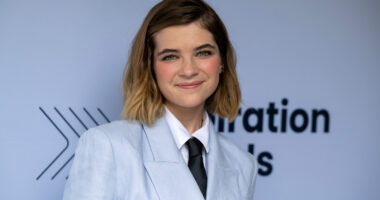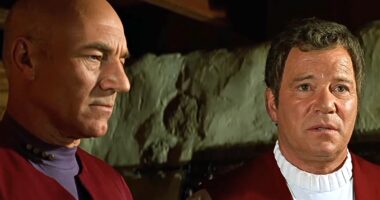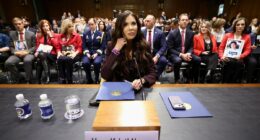Share this @internewscast.com
“Young Sheldon” captivated audiences with its rich character development and unexpectedly heartfelt moments. Unlike “The Big Bang Theory,” its predecessor known for its occasional cynicism, this spin-off introduced a world filled with characters who genuinely cared for one another, striving together to improve their lives. Despite the Coopers’ battles with societal norms and financial hardships, often leading to internal conflicts, their familial love remains unmistakable.
However, all stories must eventually conclude, and “Young Sheldon” ended with a poignant, long-anticipated tragedy. The passing of George Cooper Sr. (portrayed by Lance Barber) propels his son Sheldon (played by Iain Armitage) towards future achievements. This loss, however, leaves an indelible mark on the family, creating rifts that fracture their once tightly-knit bond.
Years later, an older Sheldon (Jim Parsons) reflects on his past while penning his autobiography. As the narrative unfolds, he must confront whether his recollections align with reality. With seven seasons of storytelling culminating in this finale, viewers are treated to a final lesson in life and a glimpse of promised happiness ahead. The series finale provides a comprehensive look at what transpired prior, during, and the cast’s reactions to closing this chapter of a beloved cultural phenomenon. There are even nostalgic references to Season 1 that fans will enjoy.
Set in the 1980s and 1990s, “Young Sheldon” chronicles the early life of future Nobel laureate Sheldon Cooper. As a child with a prodigious intellect growing up in the South, the series delves into his formative years. It begins with Sheldon entering Medford High School at age 9, advancing to East Texas Tech by 11, and ultimately choosing graduate studies at Caltech at 14. Over seven seasons, Sheldon’s personal and intellectual growth is explored, alongside the friendships he forms.
Navigating this challenging journey, Sheldon must engage with individuals much older than himself on both social and intellectual fronts. At East Texas Tech, he encounters mentors like John Sturgis (Wallace Shawn), who is both supportive and neurotic, alongside Sturgis’ adversary, Dr. Grant Linkletter (Ed Begley Jr.), who offers a more straightforward guidance style. Both mentors nurture Sheldon’s inquisitiveness, sometimes to their own chagrin. Sheldon also befriends a local boy, Tam (Ryan Phuong), and bonds with college pals over “Dungeons and Dragons” and “Star Trek.” At home, he contends with his mother’s overprotectiveness while his siblings connect more easily with their father through shared athletic interests.
What you need to remember about the plot of Young Sheldon
The other Coopers also embark on their own journeys. Mary (Zoe Perry) steps into the workforce as their financial situation worsens, becoming more devout while simultaneously challenging her church’s sociopolitical climate. George’s dream of coaching college football fluctuates before he secures a position at Rice University, prompting the family’s move to Houston. Georgie (Montana Jordan), the athletically inclined but academically challenged son, faces early adulthood when a fling with Mandy McAllister (Emily Osment) results in a daughter, CeeCee. Sheldon’s spirited twin sister, Missy (Raegan Revord), evolves from an independent child into a rebellious punk, engaging in pranks and dyeing her hair. Meanwhile, Mary’s witty mother, Connie Tucker (Annie Potts), endearingly called “Meemaw,” battles legal obstacles to maintain her gambling operations while lovingly doting on her family, much to Mary and George’s exasperation.
It’s not an easy road for him, of course, to make his way in this new world. He’s a small child coping with people much older than he is, forced to relate to them on both a social and intellectual level. At East Texas Tech, he finds John Sturgis (Wallace Shawn), an early but neurotic mentor, and Sturgis’ rival, Dr. Grant Linkletter (Ed Begley Jr.), who provides a more brusque counterpoint to Sturgis’ ways. Both men promote Sheldon’s curiosity, though sometimes they do live to regret it. At home, Sheldon makes friends with a boy named Tam (Ryan Phuong) and also makes buddies with some college friends with whom he will play “Dungeons and Dragons” as well as share his obsession with “Star Trek.” At home, Sheldon has to battle his mother’s tendency to coddle him, while his more athletic siblings have an easier time bonding with his dad.
The rest of the Coopers grow alongside Sheldon
Naturally, the rest of the Coopers get their own character arcs. Mother Mary (Zoe Perry) steps into the professional world and takes up the slack when the family’s financial status grows dire. She becomes more religious as she searches for meaning and purpose in life, but also rebels against the politics and social atmosphere of her church. George’s dream of becoming a professional college football coach wavers and then blooms. He finally attains a position at Rice University, requiring the whole family to move to Houston. Athletically gifted but intellectually dim son Georgie (Montana Jordan) must embrace adulthood early when a one-night stand with older woman Mandy McAllister (Emily Osment) results in the birth of his daughter, CeeCee. Sheldon’s sassy twin sister, Missy (Raegan Revord), goes from being an independent young girl to a punk rock rebel, ditching school, pulling pranks, and dying her hair. And Mary’s beloved, wisecracking mom Connie Tucker (Annie Potts), called “Meemaw” by her grandkids, fights the law to keep her various illegal betting operations open while adoring her kids and driving Mary and George crazy.
The Coopers live in a fictional hamlet called Medford, and there, a wide assortment of wacky friends, neighbors, colleagues, and teachers help them get through life. Most prominent in the pack are Jeff Difford (Matt Hobby), the judgmental and hypocritical reverend of the Baptist church where Mary works and the Coopers are occasional parishioners, and the Sparks family, including Brenda (Melissa Peterman), who contemplates an affair with George Sr., and her kids Billy and Bobbi, who get tangled up with the Cooper kids.
What happened at the end of Young Sheldon?
As foretold by “The Big Bang Theory,” George Sr. does not live to see the green grass of Rice Stadium. He dies of a heart attack while he’s at the office before the family can move, and the rest of the Coopers learn about his fate while preparing to take a portrait together to celebrate the occasion. The Coopers react with shock and horror, and the community rallies around them. A devastated Mary tries to regroup and shepherd her children through George’s funeral and the aftermath of his death. She barely hangs on to her composure, breaking down in the aftermath of George’s passing. She spends much of her time at his graveside and plenty at the church, where she tries to cope with George’s death.
Her desire for religious succor eventually causes her to order, then beg, the twins to be baptized. Missy bolts from the ceremony at the last minute, feeling completely estranged from God in the midst of her grief. She remains unbaptized at the end of the episode. Sheldon goes through with his spiritual rebirth — albeit in a wetsuit, so he won’t catch anything from the baptismal font. Afterward, he professes no renewed interest in God. He goes about town tying up loose ends, then flies out to California. Audiences last see him as he strides onto the campus of Caltech and into a future filled with friendship and love — leaving behind a house filled with memories that we’re told Mary will eventually sell.
In the present, Sheldon narrates his life
Throughout the episode — as he often did during the series proper — a now grown-up Sheldon narrates snatches of his autobiography. In doing so, he comes to appreciate everything Mary has done for him and realizes that the stories he told about George’s drinking were falsehoods intended to distance himself from his grief. This serves as an important lesson for him, since he refuses to attend his son, Leonard’s, hockey game until Amy points out he should learn a lesson from his parent’s choices. Sheldon does, barely, and attends his son’s hockey game, even wearing the team’s jersey.
We also receive post-“The Big Bang Theory” updates on how his life with Amy (Mayim Bialik) is going. For the first time in “Young Sheldon” history, fans see an older Sheldon and Amy in the flesh, living their lives in a lovely suburban home. They have apparently moved away from downtown Pasadena over the years, finally splitting the household Sheldon maintained with Leonard. Their children are also thriving, even though neither of them seems to be scientific. To wit, Sheldon is horrified by the news that his daughter wants to be an actress, perhaps thanks to the undue influence of a regularly babysitting but unseen Penny.
Sheldon’s climb toward adulthood peaks here
“Young Sheldon” is a coming of age tale at its heart; though the titular character might remain immature to a degree, it’s in Texas where he gains the building blocks that will help propel his life. While attending college, lifelong patterns in his relationship with his family emerge. In the family home, he learns about the importance of patience, love, and kindness. While Sheldon will always be insular, rigid, and petty, he will also show love and mercy to those he cares about.
In spite of how often Sheldon castigates his parents in “The Big Bang Theory,” he has learned how to be a better man because of them. That final lesson is well imparted by the last episode. In the past, fans watch Sheldon swallow his pride and atheist leanings to be baptized. He pledges his heart to a God he doesn’t believe in just to make a bewildered and grieving Mary feel safe, proud, and happy. In the present timeline, he ignores his distaste for athletic contests to be there for his son, even donning a hockey jersey when Amy tells him to. Here, he finally follows in Mary’s footsteps, realizing that his family is the biggest treasure he’ll ever have — the one that George and Mary formed back in Texas, and the one that he now has with Amy. His own personal preferences, discomfort, and concerns are miniscule compared to that love.
Sometimes, reflecting on your past changes your present
During the final episode of “Young Sheldon,” the titular character comes to realize how much of an unreliable narrator he can be, even when it comes to his own life. For years on “The Big Bang Theory,” he described his childhood as a redneck nightmare, with an alcoholic, philandering father and a home on wheels. He described underage drinking with Georgie and plenty of other cornpone activities during that time and expressed varying amounts of disdain for everyone he knew back then, except for Meemaw, a saint who calls him “moonpie.”
But upon reexamining his life, Sheldon recalls a loving father who doesn’t drink any more than the average man. Sheldon’s childhood home is in a secure suburban area — though they must deal with natural disasters like tornadoes, there are no major dangers, no trailer ready to tilt over at any second. While the Coopers struggle financially, there is no sense of overwhelming poverty about them. His conservative, religious mother also supports and believes in him, casting further doubts on Sheldon’s earlier proclamations about her.
Recognizing the gulf between his reality and what he thought he knew is a major step forward emotionally for Sheldon, who is one of the most rigid and unchanging characters in the sitcom world. Even people he loves in an uncritical fashion — like his beloved Meemaw — are more rascally and less perfect than he initially recalled them to be. “Young Sheldon” is, in short, about the malleable nature of what one believes to be the truth.
Sheldon isn’t the only one who has been changed
Sheldon isn’t the only one who is much changed by his time in Texas. Georgie states during the series finale that he and Mandy are going to move in with her parents to raise CeeCee in a neighboring home — launching their own spin-off in the process, “Georgie and Mandy’s First Marriage.” Georgie has both changed the most and the least when it comes to the Cooper kids, but he’s still the same goofy, immature guy who constantly fought with Missy and Sheldon back in the day. He will, we know, take on the mantle of caring for Missy and Mary when Sheldon goes to California, ceding all “man of the house” responsibilities to Georgie. Yet the series finale shows how he has the right sort of basic value system and why he will grow up to become Dr. Tire, a man responsible for so much more than changing CeeCee’s diapers.
Missy, too, is becoming someone entirely different. The little girl who was a jock, who didn’t back down from a fistfight but also loved going out to dinner with her daddy, has become a rebel. Probably her greatest act of rebellion is to reject a baptism and leave the church sobbing, firmly rejecting Mary’s value system to implement one she will embrace out of anger. We know thanks to later “The Big Bang Theory” anecdotes that Sheldon will be an atheist and Missy will try out atheism herself — and these moments help lay out her future here. But she definitely isn’t a sweet little girl any more than Sheldon is still a wide-eyed innocent.
The final episode harkens back to Season 1
The baptism plotline itself is a callback to the first season of “Young Sheldon,” in which Mary tries to take Sheldon to church with her, but he refuses to express any actual belief in God. One specific line of dialogue returns to the pilot itself. When Mary convinces Sheldon to be baptized, he says to her, “I don’t believe in God, but I believe in you.” He said something similar — declaring “I believe in Mom” when asked if he believes in God by another adult — during the show’s first outing.
This was an intentional gesture from the writing team, per co-creator Steve Holland. “Connor Kilpatrick, one of our writers, had pitched that, because in the Baptist church you don’t get baptized until you’re a teenager and can choose it for yourself. That would be very important to Mary, especially before she sent Sheldon off to college, knowing that his soul was safe. … It felt like it gave you a moment at the end where Sheldon could echo the pilot or the early episodes where he said, ‘I don’t believe in God, but I do believe in you,’” he told Variety.
That’s just one Easter egg that’s visible during the series finale. In Sheldon’s adult office, his childhood train set can be spotted above the door. Other props from Sheldon’s apartment in “The Big Bang Theory” appear in his new office as well, scattered about; they came directly from the show’s old set, which is preserved on the Warner Bros. lot and is a part of the studio’s tour.
What has the cast and crew of Young Sheldon said about the ending?
The children who grew up on the “Young Sheldon” set all expressed bittersweet sentiments as the show rolled to a close. After all, they first walked on the set as a bunch of young kids and left it as teenagers. They mainly reflected upon the experience on Instagram. “I’ve always wondered what this day would feel like and now it’s here! Thank you for a wonderful ride,” Iain Armitage said in part on Instagram.
Raegan Revord was equally moved. “I love this cast, our incredible crew, and these characters so much not having them in my life everyday seems impossible. But I’m also filled with wonderful memories, a beautiful childhood, a family forever, and gratitude,” she said in part on her own Instagram.
Series co-creator Steve Holland also mused on the process of ending the series to Entertainment Weekly. “It’s weird — I’ve been lucky enough to now do two long-running shows, and ending them is always a tricky and emotional thing,” he says. “It’s sad. It’s a little bit of a relief to have gotten to the end and feel like we landed the ship really strongly.”
Series creator and executive producer Chuck Lorre, meanwhile, declared it was a fool’s errand to try for perfection. “You do what you feel is appropriate for the characters, the tone of the show. You do stuff that touches you, then you hope someone agrees with you. I don’t know any other way to do it,” he told Deadline. And judging from how much audiences loved it, Lorre appears to have made the right choices.







